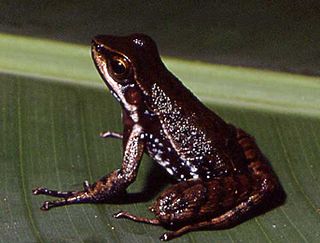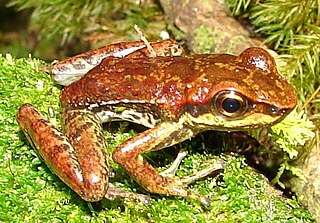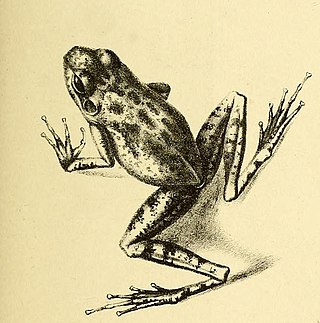
Fritziana fissilis is a species of frogs in the family Hemiphractidae. It is endemic to southeastern Brazil and known from the mountains of Espírito Santo, Rio de Janeiro, São Paulo, and Rio Grande do Sul states.

Hylodes is a genus of frogs in the family Hylodidae. The genus may be paraphyletic with respect to Megaelosia. The genus Hylodes is endemic to southeastern Brazil. Member species are also known commonly as the tree toads, or more ambiguously, as torrent frogs. They are diurnal and usually inhabit shallow mountain streams.

Hylodes asper, the warty tree toad or Brazilian torrent frog, is a species of frogs in the family Hylodidae. It is endemic to the Rio de Janeiro and São Paulo states in southeastern Brazil. Living in a high-noise environment, the species uses "semaphoring" to supplement acoustic signalling.
Hylodes babax or the Caparao Mountains tree toad is a species of frog in the family Hylodidae. It is endemic to Brazil.
Hylodes dactylocinus is a species of frog in the family Hylodidae. It is endemic to Serra do Itatins, in the São Paulo state, southeastern Brazil.
Hylodes glaber or the Itatiaia tree toad is a species of frog in the family Hylodidae. It is endemic to Brazil and has been observed in and near Itatiaia. Its natural habitats are subtropical or tropical moist montane forest, subtropical or tropical high-altitude grassland, and rivers. It is threatened by habitat loss.

Hylodes heyeri is a species of frog in the family Hylodidae. It is endemic to Brazil. Its natural habitats are subtropical or tropical moist lowland forest, subtropical or tropical moist montane forest, rivers, and subterranean habitats on the Atlantic side of the country. It is threatened by habitat loss.
Hylodes lateristrigatus is a species of frog in the family Hylodidae. It is endemic to Brazil. Its natural habitats are subtropical or tropical moist lowland forest, subtropical or tropical moist montane forest, and rivers. It is threatened by habitat loss.
Hylodes magalhaesi, or the São Paulo tree toad, is a species of frog in the family Hylodidae. It is endemic to Brazil. Its natural habitats are subtropical or tropical moist montane forest and rivers. It is threatened by habitat loss. They measure between 28 and 32 mm, and live at altitudes of 1400 to 1800 m in the Mantiqueira mountain range.

Hylodes meridionalis, also known as the Rio Grande tree toad, is a species of frog in the family Hylodidae. It is endemic to Brazil, in the states of Rio Grande do Sul and Santa Catarina. Its natural habitats are subtropical or tropical moist lowland forest and rivers. It is threatened by habitat loss stemming from deforestation, pine and banana plantations, and water pollution, as well as infection from the amphibian chytrid fungus, Batrachochytrium dendrobatidis.
Hylodes mertensi or Merten's tree toad is a species of frog in the family Hylodidae. It is endemic to Brazil. Its natural habitats are subtropical or tropical moist lowland forest and rivers. It is threatened by habitat loss.

Hylodes nasus is a species of frog in the family Hylodidae. It is endemic to Brazil. Its natural habitats are subtropical or tropical moist lowland forest and rivers. This frog has been observed 1400 meters above sea level.
Hylodes ornatus or the ornate tree toad is a species of frog in the family Hylodidae. It is endemic to Brazil. Scientists know it from the type locality, Parque Nacional do Itatiaia in the state of Rio de Janeiro. Its natural habitats are subtropical or tropical moist lowland forest, subtropical or tropical moist montane forest, and rivers. It is threatened by habitat loss.
Hylodes otavioi, Otavio's stream frog, or the Otavio tree toad is a species of frog in the family Hylodidae.

Hylodes phyllodes, or the Boraceia tree toad, is a species of frog in the family Hylodidae. It is endemic to Brazil. It has been observed in Serro do Mar in the state of São Paulo. Its natural habitats are subtropical or tropical moist lowland forest and rivers. It is threatened by habitat loss.

Hylodes sazimai is a species of frog in the family Hylodidae. It is endemic to Brazil. Its natural habitats are subtropical or tropical moist lowland forest, subtropical or tropical moist montane forest, and rivers. It is threatened by habitat loss.
Hylodes uai is a species of frog in the family Hylodidae. It is endemic to the Espinhaço Mountains in the Minas Gerais state, Brazil, where it is known from the Mangabeiras Park in Belo Horizonte, and another location on the southern end of the Espinhaço Mountains. It is the most-inland species of the genus.
Hylodes vanzolinii is a species of frog in the family Hylodidae.
Dasypops is a genus of frog in the family Microhylidae. It is monotypic, being represented by the single species, the Rio Mutum frog. It is endemic to the coastal plain of Espírito Santo and Bahia states of eastern Brazil. Its natural habitats are lowland forests, including secondary forests and forest edges. It is an explosive breeder that breeds in temporary pools. It is potentially threatened by habitat loss.
Synapturanus mirandaribeiroi is a species of frog in the family Microhylidae. It is found in Brazil, Colombia, French Guiana, Guyana, Suriname, and Venezuela. Its natural habitat is subtropical or tropical moist lowland forests. It is threatened by habitat loss.








